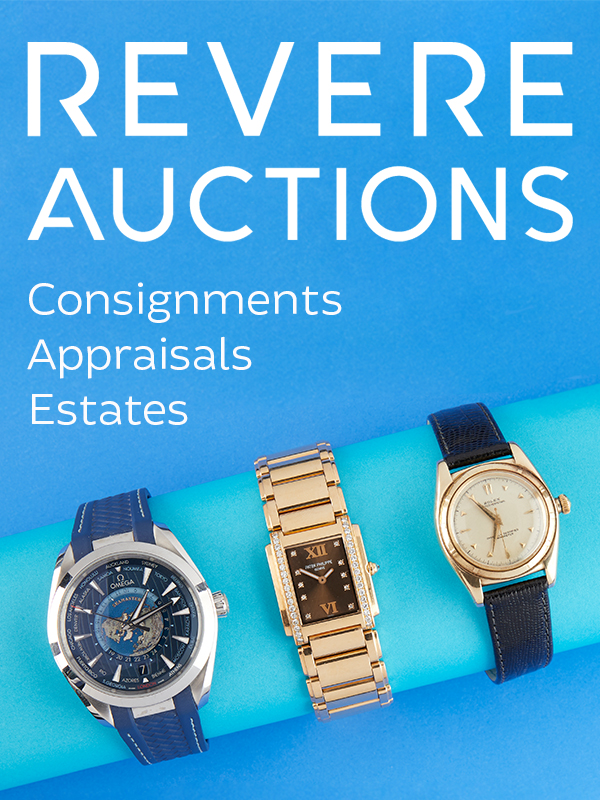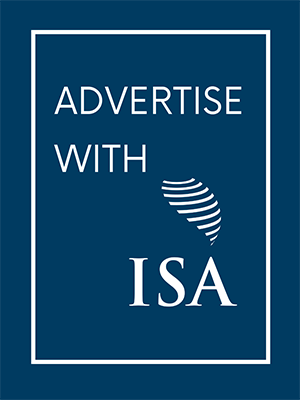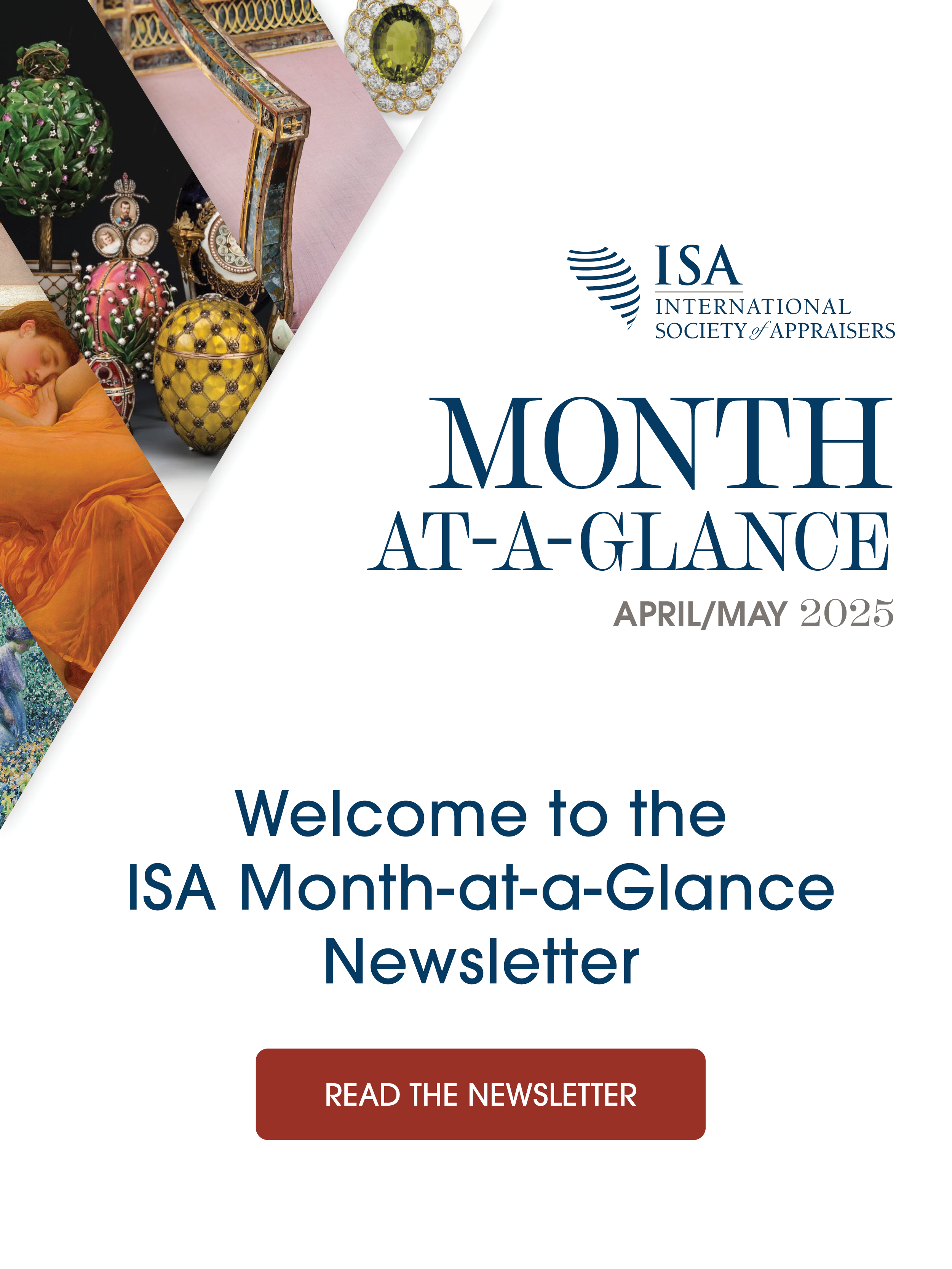Bylaws
International Society of Appraisers
Bylaws
Article I – Organization
Section 1. Purpose. The International Society of Appraisers (“ISA”) is an Illinois not-for-profit corporation organized and operated under Section 501(c)(6) of the Internal Revenue Code. ISA’s purposes are to disseminate knowledge and information in the field of personal property appraisal, to promote high standards of accuracy, competence, and integrity in the field of personal property appraisal, and to perform all activities necessary therefor which are permitted under IRC Section 501(c)(6) (“Exempt Purpose”).
Section 2. Offices. ISA shall continuously maintain a registered office in the State of Illinois and a registered agent at the same address. ISA may have other offices within or outside the State of Illinois as determined by ISA’s Board of Directors (“Board”).
Article II – Members
Section 1. Designations. ISA shall have the following membership level and professional designations. The designations, qualifications, and voting rights for each are outlined in this Article.
Section 1.1. ISA Candidate. An individual is eligible for the “ISA Candidate” designation who: (i) seeks to become a Member; (ii) submits for consideration references with acceptable credentials pertaining or relating to personal property appraising; and (iii) meets any other requirements adopted by the Board. The ISA Candidate designation represents an individual considering and pursuing a career as a personal property appraiser at the entry level, and it is not considered a membership designation. ISA Candidates have no voting rights.
-
Section 1.2. Member. An individual is eligible for “Member” designation who: (i) completes the “ISA Core Course in Appraisal Studies”; (ii) accumulates a minimum of three years of satisfactory market-related experience in their chosen specialty field; (iii) complies with the ISA Report Writing Standards and Uniform Standards of Professional Appraisal Practice (USPAP); and (iv) meets any other requirements adopted by the Board. A Member may identify themselves as a “Member of the International Society of Appraisers” and may use the “ISA” acronym and a designated ISA logo, provided said uses are in strict compliance with ISA’s Policy on Use of ISA Name, Marks and Logos (“Trademark Policy”). Members in good standing have a right to vote on matters presented to ISA’s membership for a vote.
Section 1.3. Accredited Member. An individual is eligible for “Accredited Member” designation who (i) satisfies all requirements for “Member” designation; (ii) demonstrates essential knowledge in their chosen specialty field(s) by pathways defined by ISA’s Credentialing Policy; and (iii) meets any other requirements adopted by the Board. Accredited Members in good standing may use the “ISA AM” acronym and ISA logo, provided said uses strictly comply with ISA’s Trademark Policy. Accredited Members in good standing have a right to vote on matters presented to ISA’s membership for a vote.
Section 1.4. Certified Member. An individual is eligible for the “Certified Member” designation who (i) is an ISA Accredited Member; (ii) completes a designated comprehensive program of professional study and testing in the Certified Appraiser of Personal Property (CAPP) program; and (iii) meets any other requirements adopted by the Board. The Certified Member may use the “ISA CAPP” acronym and ISA logo, provided said uses strictly comply with ISA’s Trademark Policy. Certified Members in good standing may have a right to vote on matters presented to ISA’s membership for a vote.
Section 1.5. Life Member. An individual is eligible for the “Life Member” designation who: (i) is an ISA Accredited Member or an ISA CAPP; (ii) Nominated by the Awards Committee, and voted by the Board; and (iii) meets any other requirements adopted by the Board. Life Members in good standing have a right to vote on matters presented to ISA’s membership for a vote.
Section 1.6. Honorary Member. An individual is eligible for the “Honorary Member” designation who: (i) ISA deems worthy of the special honor because of notable contributions, mentoring, or other advancements in the field of personal property appraisal; and (ii) meets any other requirements adopted by the Board. Whether an individual is eligible for Honorary membership is in the sole discretion of the Board. Honorary Members are not required to pay dues.
Section 1.7. Student Affiliate. An individual is eligible for “Student Affiliate” designation who: (i) is enrolled and in good standing in an accredited college, junior college, community college, university, or graduate program (“School”) acceptable to the Board; (ii) is interested in a career as a personal property appraiser; and (iii) meets any other requirements adopted by the Board. Student Affiliates may not perform appraisal services or represent themselves as appraisers. Student Affiliates may identify as “Student Affiliates“ of the International Society of Appraisers” using physical and digital marketing tools, including resumes and social media, but may not use any ISA acronyms, logos, and other trademarks. Student Affiliates are not eligible to serve on committees and have no voting rights. Student Affiliate status is limited to four (4) years (successive or non-successive). Student Affiliates are deemed to have voluntarily resigned their ISA membership immediately upon being expelled from or otherwise out of good standing with their school.
Section 1.8. Definitions and Interpretations. The definitions and interpretations of words, phrases, terms, and language pertaining to member qualifications and all other provisions in these Bylaws shall be determined by the Board in its sole discretion.
Section 2. Election of Members. Any person eligible for membership under these Bylaws may apply for membership on such forms as may be prescribed by ISA for approval by the Board, which approval will be exercised in the Board’s sole discretion. From time to time, the Board shall adopt policies and procedures regarding the application for and determination of membership in ISA.
Section 3. Application and Membership Fees. The Board shall determine application fees, annual membership dues, other assessments, and late fees applicable to the foregoing payment.
Section 4. Proxy Voting Prohibited. Proxy voting is not allowed.
Section 5. Termination of Membership.
Section 5.1. Nonpayment of Dues. Any member not paying annual dues, or any other amount due ISA, at the time the same is due, shall automatically be deemed not in good standing and immediately lose all rights and benefits of their membership. If said member’s dues remains unpaid for thirty (30) days after its due date, the member shall be deemed to have voluntarily resigned their membership in accordance with Section 5.4 of this Article II.
Section 5.2. Violation of Code of Ethics. A member’s membership may be terminated and/or a member may be subject to other disciplinary action for violating ISA’s Code of Ethics. Any termination and/or other disciplinary action is determined by the Board in accordance with ISA’s Code of Ethics Disciplinary Procedures.
Section 5.3. Other Misconduct. Except for matters arising under Sections 5.1 and 5.2 above which are governed thereunder, the Board may terminate a member’s membership if the Board determines they engaged or are engaging in conduct that: (i) violates ISA’s Bylaws, rules, regulations, policies, or procedures, as may be amended from time to time; or (ii) is otherwise contrary to ISA’s interests. In the event the Board seeks to terminate any membership in accordance with this provision, ISA will notify the member that the Board will consider terminating their membership during a Board meeting no less than twenty-one (21) days following the day the notice is provided to the member (which Board meeting date must be included in the notice). The notice shall inform the member that they may submit a written response to the Board in advance of its meeting, which the Board will review and consider in determining whether to terminate the member’s membership. The Board’s decision of whether to terminate a member’s membership is final and not subject to appeal. A terminated member is not entitled to the return of previously paid annual dues or other fees, or any portions thereof.
Section 5.4. Resignation. Any member of ISA may resign by filing a written resignation with ISA’s Executive Director (“ED”) or ED’s designee. Any resigning member shall continue to be responsible for the payment of all membership annual dues, assessments, and other charges until the end of the year of such member’s resignation, and the resignation does not relieve the resigning member of the obligation to pay any dues, assessments or other charges accrued and unpaid by said member. Resigning members are not entitled to the return of previously paid dues or other fees, or any portions thereof.
Section 5.5. Reinstatement. After receiving a written request signed by a former member and filed with ISA’s Administrative Office, the Board may reinstate such former member to membership upon such terms as the Board may deem appropriate. In cases where the former member’s membership terminated as a result of their nonpayment of dues within the previous twenty-four (24) months, the ED is authorized to approve the request for reinstatement without further Board action.
Section 5.6. Transfer of Membership. Membership in ISA is not transferable or assignable.
Section 6. Use of ISA Name, Marks, and Logos. Only ISA members may display or use ISA’s name, logos and other trademarks (collectively “Trademarks”), and only in strict accordance with ISA’s Bylaws, Trademark Policy, and any other applicable governing documents. All other use of ISA’s Trademarks is strictly prohibited and will subject a member to having their membership terminated.
Article III – Meetings of the General Membership
Section 1. Annual and Regular Meetings. An annual member meeting, and any additional regular member meetings, shall be held at such time and place as determined by the Board. At each meeting, the voting members shall conduct any business as may properly come before the members.
Section 2. Special Meetings. The Board may call special meetings of the members or a vote by mail ballot. The time and place for said special meetings shall be determined by the Board provided the same complies with these Bylaws and applicable laws.
Section 3. Notice of Meetings. Written notice stating the place, date, and hour of any member meetings shall be delivered to each member entitled to vote at such meeting no less than five (5) nor more than sixty (60) days before the date of such meeting or, in the case of a merger, consolidation, dissolution, sale, lease, or exchange of assets, no less than twenty (20) nor more than sixty (60) days before the date of the meeting. In case of a special meeting or when required by statute or by these Bylaws, the purpose(s) for which the meeting is called shall be stated in the notice. When a meeting is adjourned to another time or place, notice need not be given of the adjourned meeting if the time and place thereof are announced at the meeting at which the adjournment is taken.
Section 4. Waiver of Notice. Any member may waive notice of any meeting before, at, or after such meeting. The attendance of a member at a meeting shall constitute a waiver of notice of such meeting, except where a member attends a meeting for the express purpose of objecting to the transaction of any business because the meeting is not lawfully called or convened and presents their objection at the beginning of the meeting or promptly upon their arrival.
Section 5. Record Date. To determine the members entitled to notice of or to vote at any meeting of members, or to determine members for any other proper purpose, the Board may fix in advance a date as the record date for any such determination of members, such date, in any case, to be no more than sixty (60) days and, for a meeting of members, no less than five (5) days, or in the case of a merger, consolidation, dissolution, sale, lease, or exchange of assets, no less than twenty (20) days before the date of such meeting. If no record date is fixed for the determination of members entitled to notice of or to vote at a meeting of members, the date on which notice of the meeting is delivered shall be the record date for such determination of members. When the determination of members entitled to vote at any member meeting is made, such determination shall apply to any meeting adjournment.
Section 6. Quorum and Manner of Acting. The members holding one-twentieth (1/20) of ISA’s voting membership shall constitute a quorum at such meeting, provided that if less than one-twentieth (1/20) of the members are present at the meeting, a majority of the members present may adjourn the meeting at any time without further notice. If a quorum is present, the affirmative vote of a majority of the members at the meeting shall be the act of the members unless the vote of a greater number is required by the Illinois General Not-for-Profit Corporation Act (“Act”), the Articles of Incorporation (“AOI”), or these Bylaws. At any adjourned meeting at which a quorum is present, any business may be transacted that might have been transacted at the original meeting.
Section 7. Informal Action by Voting Members. Unless otherwise provided in ISA’s AOI or these Bylaws, any action required to be taken at any member meeting may be taken without a meeting via written ballot by mail, email, or any other electronic means under which the members entitled to vote thereon are given the opportunity to vote for or against the proposed action, and the action receives approval by a majority of the members casting votes, or such larger number as may be required by law, the AOI, or these Bylaws, provided the number of members casting votes would constitute a quorum if such action had been taken at a meeting. Voting must remain open for no less than five (5) days from the date the ballot is delivered; provided, however, in case of a merger, consolidation, dissolution, sale, lease, or exchange of assets, the voting must remain open for no less than twenty (20) days from the date the ballot is delivered. Such informal action by members shall become effective only if, at least five (5) days before the effective date of such informal action, a notice in writing of the action is delivered to all members entitled to vote concerning the subject action.
Article IV – Board of Directors
Section 1. General Powers. The Board shall manage the affairs of ISA. The Board may adopt such rules, regulations, policies, and procedures for the conduct of its business as shall be deemed advisable and may, in the execution of the powers granted herein, appoint such agents as it may consider necessary. In these Bylaws, wherever the Board’s authority to act is provided, said authority shall be exercised in the Board’s sole and absolute discretion.
Section 2. Number, Tenure and Qualifications. The Board shall be composed of nine (9) members (“Directors”). Directors shall be elected for three-year terms, which terms, to the extent practical, shall be equally staggered. No Director who has served two consecutive three-year terms is eligible for election to an additional term until three (3) years have elapsed since the end of their second consecutive three-year term. Each Director shall hold office until their successor is elected and qualified or until their death or resignation. Candidates for Directors must have been members of ISA for at least three (3) years and be an Accredited or Certified member in good standing.
Section 3. Election and Qualification. The Nominating Committee shall identify individuals to be nominated for election to the Board following procedures established by the Board. Nominees must meet such criteria as the Board shall establish. Directors shall be elected by the membership under procedures approved by the Board.
Section 4. Absence. Any Director absent for two (2) regular meetings of the Board during a single fiscal year, provided said absences are not determined excused by the Board, shall be deemed to have voluntarily resigned as a Director. The vacancy shall be filled as provided in these Bylaws.
Section 5. Resignation and Removal. Any Director may resign by giving written notice to the President and the ED. A Director may be removed with or without cause, as the Act specifies.
Section 6. Annual Meeting. The Board’s annual meeting shall be held without other notice than these Bylaws.
Section 7. Other Regular Meetings. The Board may provide by resolution the time and place for the holding of additional regular Board meetings without other notice than such resolution.
Section 8. Special Meetings. Special Board meetings may be called by or at the request of the President or any two Directors. The person(s) authorized to call special Board meetings may fix any place as the place for holding any special Board meetings called by them.
Section 9. Notices. Notice of any special meeting of the Board shall state the time, date and place of the meeting and shall be delivered at least five (5) days before the date of such meeting. Neither the business to be transacted nor the purpose of any regular or special Board meeting need be specified in the notice unless specifically required by law or these Bylaws. A Director may waive notice in writing, either before or after the meeting. Attendance by a Director at any meeting shall constitute a waiver of notice of such meeting except where attendance at a meeting is for the express purpose of objecting to the transaction of any business because the meeting is not lawfully called or convened.
Section 10. Quorum. A majority of the Directors shall constitute a quorum for the transaction of business at any duly called Board meeting. If less than a majority of Directors is present at any meeting, the meeting shall be adjourned to another time and notice of the future meeting date and time shall be sent to all Directors.
Section 11. Manner of Action. The act of a majority of the Directors present at a meeting at which a quorum is present shall be the act of the Board unless the act of a greater number is required by statute, the AOI or these Bylaws. No Director may act by proxy on any matter.
Section 12. Informal Action. An action required to be taken by the Board may be taken without a meeting if a dated consent in writing (whether in hard copy, email, or other electronic format) setting forth the action to be taken is signed by all Directors entitled to vote concerning the subject matter thereof. The consent shall be evidenced by one or more written approvals, each of which sets forth the action taken and provides a written record of approval. All the approvals evidencing the consent shall be delivered to the Secretary and filed in the corporate records. The action taken shall be effective when all the Directors approve the consent unless the consent specifies a different effective date.
Section 13. Electronic Meeting Participation. Directors may participate in any meeting virtually by means through which all persons participating in the meeting can communicate with each other. Such participation in a meeting shall constitute full presence at the meeting.
Section 14. Vacancies. The Board shall fill any vacancy occurring on the Board. A Director appointed to fill a vacancy shall serve for the unexpired term of their predecessor.
Section 15. Compensation. Directors shall not be compensated for their services as Directors. However, following ISA policy regarding expense reimbursements, Directors may be reimbursed for their reasonable travel and other qualified expenses. A Director may serve ISA in a capacity unrelated to their duties as a Director for reasonable compensation and as authorized by the Board.
Section 16. Prohibited Joint Board Membership. A Director may not simultaneously serve on the Board of another personal property appraisal organization or the Board of a chapter of another personal property appraisal organization.
Article V – Officers
Section 1. Enumeration. The ISA officers shall include a President, Vice President, Secretary, and Treasurer. The Board may also elect additional officers as it deems appropriate.
Section 2. Election and Term. The Board shall elect the officers who shall hold office until their successors are elected and qualified or until their term on the Board ends as a result of their death, resignation, or removal. A Director must have served at least one (1) full year on the Board before being eligible to serve as President. The President’s term shall be two (2) years. A Director may not serve more than two (2) terms as President. A partial term served by an individual on the Board to fill a vacancy in the office of President does not count as a term for purposes of the foregoing maximum two (2) term limit. All other offices shall have a one (1) year term.
Section 3. President. The President shall preside at all member and Board meetings; oversee the implementation of all resolutions and directives of the Board; discharge all duties incident to the office of President; and complete such other duties as may be prescribed by the Board. Except in those instances in which the authority to execute is expressly delegated to another ISA officer or agent, or a different mode of execution is expressly prescribed by the Board or these Bylaws, the President may sign any Board-authorized deeds mortgages, bonds, contracts, or other instruments.
Section 4. Vice President. The Vice President shall perform all duties incident to the office and have such other powers as shall be assigned by the President or the Board. In the absence of the President or in the event of the President’s inability or refusal to act, the Vice President shall perform the duties of the President and, when so acting, shall have all the powers of and be subject to all the restrictions upon the President.
Section 5. Secretary. The Secretary shall perform all duties incident to the office and have such other powers as may be assigned by the President or the Board from time to time. With the Board’s approval, the Secretary may delegate specific duties to other persons to effectively conduct ISA’s affairs.
Section 6. Treasurer. The Treasurer shall have charge of and be responsible for maintaining adequate books of account for ISA and shall perform all duties incident to the office and such other duties as assigned by the President or the Board. With the Board’s approval, the Treasurer may delegate specific duties to other persons to effectively conduct ISA’s affairs.
Section 7. Resignation and Removal. Any officer may resign by providing written notice to the President, Secretary, or ED. Unless otherwise specified in the notice, the resignation shall be effective upon delivery. The acceptance of a resignation is not necessary to make it effective. If an officer resigns as a Director, the Director shall be deemed to have resigned as an officer as of the date and time the individual resigned as Director. The Board may remove any officer if the Board determines it to be in ISA’s best interests.
Section 8. Vacancies. A vacancy in any office may be filled for the unexpired portion of the term by the Board.
Section 9. Compensation. Unless otherwise approved and authorized by the Board, officers shall not be compensated for their services as officers.
Section 10. Executive Director. The Board shall hire an Executive Director (ED), directly or through a management company, upon such reasonable terms and conditions as the Board determines. The ED shall report directly to the Board. The ED shall be ISA’s principal executive, operating, and administrative staff member, responsible for implementing the budgets, policies, procedures, and directions of the Board and ISA’s day-to-day business affairs. The ED shall be responsible for preparing, assuring the accuracy of, executing, and timely filing of all government forms and filings required by law on ISA’s behalf. The ED may negotiate and execute any contract on ISA’s behalf, provided its terms fall within the parameters of the budget, policies, and procedures approved by the Board. All ISA staff and contractors shall report to the ED unless otherwise directed by the Board or required by law. The ED shall have other responsibilities and perform such other duties as determined by the Board. The Board shall determine the specific title given to the ED position.
Article VI – Chapters
Section 1. Definition. ISA members may apply for and, if approved by ISA, establish an ISA Chapter (“Chapter”), which is a separate and independent corporate entity created to advance the same purpose as ISA and, therefore, permitted by ISA to be designated as an ISA Chapter, whose are also members of ISA. Chapters provide an opportunity for personal property appraisers to meet frequently to share information for the betterment of the profession, thereby advancing ISA’s Exempt Purpose.
Section 2. Formation. To establish a Chapter, an ISA member must submit to ISA a Petition for Chapter Designation (“Petition”) on a form prescribed by ISA, which must be signed by no less than five (5) ISA members who reside in the Area and who affirm they will become members of the Chapter upon its creation. If a Petition is granted by the Board. the Chapter must agree to and execute (by its authorized agent) a contract with ISA (i.e., Articles of Affiliation) in the form designated by ISA, which sets forth, without limitation, the terms and conditions to which the Chapter must comply to maintain its Chapter Designation, and incorporates by reference ISA’s Chapter Manual to which all Chapters are also subject.
Section 3. Term and Termination. After becoming a Chapter following ISA’s policies and procedures, a Chapter will continue to operate as a Designated Chapter under its Articles of Affiliation and ISA’s policies and procedures until either: (i) ISA terminates the Articles of Affiliation or (ii) the Chapter notifies ISA of its planned or pending dissolution. Without limiting the foregoing, ISA may establish and dissolve Chapter Designations in its sole discretion.
Article VII – Committees and Advisory Bodies
Consistent with the Act, Article VII differentiates between committees that carry the authority of the Board (described in Section 1 and referred to herein as “committees”) and those that serve in an advisory capacity, making recommendations to the Board but not independently authorized to act on the Board’s behalf (described in Section 2 and referred to herein as “advisory bodies”).
Section 1. Committees. In addition to the standing committees identified in Article VIII below, the Board, by resolution, may designate more committees. Each committee will consist of two or more Directors and such other person(s) as the Board designates, provided a majority of each committee’s members are Directors, and that a Director serves as the committee Chair. The composition of all committees must be approved by the Board. Each committee shall have and exercise the authority of the Board in ISA’s management provided in these Bylaws, the resolution establishing the committee, and any charter, guidelines, or rules adopted by the Board for the committee. However, no committee shall have the power or authority to:
• Adopt a plan for the distribution of ISA’s assets or for dissolution;
• Approve or recommend to members any action required by the Act to be approved by members;
• Fill vacancies on the Board or any of its committees;
• Elect, appoint, or remove any officer or Director or member of any committee or commit ISA to compensate any member of a committee;
• Adopt, amend, or repeal these Bylaws or the AOI;
• Adopt a plan of merger, or adopt a plan of consolidation, or authorize the sale, lease, exchange or mortgage of ISA’s property or assets; or
• Amend, alter, repeal, or act inconsistent with any resolution or action of the Board when the resolution or action of the Board provides by its terms that it shall not be amended, altered, or repealed by action of a committee.
In addition, absent an express statement to the contrary in these Bylaws, the resolution establishing the committee, or a committee’s charter adopted by the Board, a committee shall not have the authority to enter into any contract or otherwise legally bind ISA. The designation of a committee and the delegation thereto of authority shall not operate to relieve the Board or any individual Director of any responsibility imposed on the Director by law.
Section 2. Advisory Bodies. In addition to those identified in these Bylaws (listed and described in Article VIII), the Board, by resolution, may designate one or more advisory teams, commissions, task forces, and other advisory bodies (collectively, “advisory bodies”), which shall not have or exercise the authority of the Board. Other than as specified in these Bylaws, advisory bodies shall consist of such person(s) as the Board designates, and the Board shall determine whether an advisory body must include Directors. The advisory body may not act on ISA’s behalf or bind it to any actions but may make recommendations to the Board or ISA officers.
Section 3. Governance Applicable to Committees and Advisory Bodies.
Section 3.1. Term. Unless otherwise stated in these Bylaws or a charter adopted by the Board for the committee/advisory body, committee/advisory body member terms shall commence when the committee/advisory body member is appointed and end at fiscal yearend.
Section 3.2. Resignation or Removal. A committee/advisory body member may resign by providing written notice to the Secretary and ED. A committee/advisory body member may be removed by the Board for any reason, or no reason at any time. A committee/advisory body member who fails to return to ISA a completed Annual Conflict of Interest Disclosure Statement required by ISA’s Conflict of Interest Policy by the due date established by the Board or who fails to attend two consecutive committee/advisory body meetings, without the subject committee/advisory body’s approval, shall be deemed to have resigned from the committee/advisory body.
Section 3.3. Vacancies. The President shall fill vacancies in any committee/advisory body with the Board’s approval.
Section 3.4. Chair. To the extent these Bylaws or the resolution or charter establishing a committee/advisory body does not identify a Chair for the committee/advisory body, the President shall designate the Chair for the committee/advisory body with the approval of the Board. In the absence of the Chair, the committee/advisory body members in attendance at a meeting of the committee/advisory body shall select a Chair for that meeting from among those committee/advisory body members present.
Section 3.5. Meetings. Regular committee/advisory body meetings may be established by the Board or the committee/advisory body. Other committee/advisory body meetings may be called by the Board, the President, the committee/advisory body Chair, the ED, or a majority of the committee/advisory body members.
Section 3.6. Notice. Written notice of any committee/advisory body meeting shall be delivered at least two (2) days before any committee/advisory body meeting. Notice of any committee/advisory body meeting may be waived in writing signed by the person(s) entitled to the notice before or after the meeting. An individual's attendance at any meeting shall constitute a waiver of notice of such meeting, except when the individual attends a meeting for the express purpose of objecting to the transaction of any business because the meeting is not lawfully called or convened.
Section 3.7. Quorum. A majority of a committee/advisory body shall constitute a quorum unless otherwise stated herein or in the resolution or charter forming the subject committee/advisory body.
Section 3.8. Manner of Action. The act of a majority of the committee/advisory body members present at a meeting at which there is a quorum shall be the act of the committee/advisory body unless a greater number is required by statute, these Bylaws, or the AOI.
Section 3.9. Electronic Meeting Participation. A committee/advisory body member may participate in and act at any meeting of a committee/advisory body virtually through means by which all persons participating in the meeting can communicate with each other. Participation in a meeting shall constitute full presence at the meeting.
Section 3.10. Proxy Voting. No committee/advisory body member may act by proxy.
Section 3.11. Informal Action. Any action required or that may otherwise be taken at a committee/advisory body meeting may be taken without a meeting if consent in writing, setting forth the action so taken, is signed by all the committee/advisory body members. The consent shall be evidenced by one or more written approvals, each of which sets forth the action taken and provides a written record of approval. All approvals shall be delivered to the Secretary and ED to be filed in the corporate records. The action will be effective when all the committee/advisory body members approve the consent unless the consent specifies a different effective date.
Section 3.12. Guidelines and Rules. The Board may adopt a charter, additional guidelines, and rules for a committee/advisory body as it deems necessary and appropriate. Each committee/advisory body may adopt rules for its governance not inconsistent with the AOI, these Bylaws, the resolution establishing the subject committee/advisory body, or any charter, guidelines, or rules adopted by the Board for the subject committee/advisory body.
Section 3.13. Authority of the Board. The Board may, at any time, dissolve, reconstitute, alter, remove a member of, or take any other action regarding a committee/advisory body that the Board determines to be in ISA’s best interest.
ARTICLE VIII – Standing Committees and Standing Advisory Bodies
Section 1. Standing Committees. Subject to Article VII of these Bylaws, ISA shall have the following standing committees:
Section 1.1. Executive Committee. The Executive Committee shall have the authority to carry out ISA’s business and functions between meetings of the Board but shall report any such actions to the Board. The Executive Committee shall consist of the President, Vice President, Secretary, and Treasurer. In addition, the ED shall serve as an ex officio member of the Executive Committee without a vote.
Section 1.2. Finance and Audit Committee. The Board charges the Finance and Audit Committee to ensure appropriate ISA oversight of financial matters. The Finance and Audit Committee shall: (i) ensure ISA’s financial resources are used to advance ISA’s Exempt Purpose; (ii) develop and transmit recommendations for ISA’s annual budget to the Board by the date set by the Board; (iii) ensure quarterly, and annual budget to actual financial reports are provided to the Board and anybody and individual directed by the Board, and (iv) perform such other duties and responsibilities as assigned by the Board. The Treasurer shall chair the Finance and Audit Committee, which shall consist of at least five (5) but no more than seven (7) members, including the President, Vice President and one other Director. The Board shall appoint the remaining members. The majority of the Finance and Audit Committee members must be Directors.
Section 2. Standing Advisory Bodies. Subject to Article VII of these Bylaws, ISA shall have the following standing advisory bodies:
Section 2.1. Annual Conference Committee. The duties and responsibilities of the Annual Conference Committee are outlined in the Committee’s Charter adopted by the Board. In general, the Committee’s responsibility is to develop a speaker program and conference tours in conjunction with the Annual ISA Conference on Personal Property Appraising.
Section 2.2. Awards Committee. The duties and responsibilities of the Awards Committee are outlined in the Committee’s Charter adopted by the Board. In general, the Committee’s responsibility is to acknowledge members’ contributions in differing categories of endeavor, which enhance ISA’s image and the appraisal profession.
Section 2.3. Governance Committee. The duties and responsibilities of the Governance Committee are outlined in the Committee’s Charter adopted by the Board. In general, the Committee’s responsibility is to accurately maintain, monitor compliance, make recommendations, and serve as a source to interpret ISA’s governing documents and, if appropriate, recommend amendments based on actions taken by the Board.
Section 2.4. Instructor Committee. The duties and responsibilities of the Instructor Committee are outlined in the Committee’s Charter adopted by the Board. In general, the Committee’s responsibility is to develop and enhance the quality, quantity, and delivery methods of appraisal education to advance excellence for ISA members and the profession. The Director of Education shall serve as chair of the Committee.
Section 2.5. Designation and Review Committee. The duties and responsibilities of the Designation and Review Committee are outlined in the Committee’s Charter adopted by the Board. In general, the Committee’s responsibility is to review the qualifications of members applying for certification and requalification under ISA’s credentialing programs, which are dedicated to enhancing the professionalism of personal property appraisers.
Section 2.6. Education Committee. The duties and responsibilities of the Divisional Committee are outlined in the Committee’s Charter adopted by the Board. In general, under the direction of the Director of Education, the Committee's responsibility is to develop course-related activities and annually review course materials. The Committee assists in developing a curriculum for in-person learning activities that include, without limitation, antiques, furnishings + decorative arts, fine art, gems & jewelry, specialty studies, private client services, distance education, webinars, and other electronic forms of education.
Section 2.7. Ethics Committee. The duties and responsibilities of the Ethics Committee are outlined in ISA’s Code of Ethics Disciplinary Procedures adopted by the Board. In general, the Committee’s responsibility is to receive and address complaints submitted against ISA members alleging they violated ISA’s Code of Ethics.
Section 2.8. Marketing and Promotions Committee. The duties and responsibilities of the Marketing and Promotions Committee are outlined in the Committee’s Charter adopted by the Board. In general, the Committee’s responsibility is to promote and market ISA through advertising, public relations, and communications efforts.
Section 2.9. Membership Committee. The duties and responsibilities of the Membership Committee are outlined in the Committee’s Charter adopted by the Board. In general, the Committee is responsible for oversight of ISA’s member recruitment and retention.
Section 2.10. Nominating Committee. The duties and responsibilities of the Nominating Committee are outlined in the Committee’s Charter adopted by the Board. In general, the Committee is responsible for soliciting and qualifying individuals for nomination to serve on the Board. Prior to presenting nominees in accordance with the Bylaws, the Nominating Committee shall: (i) confirm the qualifications of any potential nominee; (ii) make available to all potential nominees the Bylaws and the Conflict of Interest Policy; (iii) inform potential nominees of the duties and responsibilities of the Board and applicable office; and (iv) obtain from potential nominees a signed acknowledgement stating they: (a) reviewed and understand the duties and responsibilities of the Board and applicable office; (b) are qualified and willing to serve on the Board and any applicable office; (c) will, if elected, perform to the best of their abilities, the duties and responsibilities of the Board and any applicable office; and (d) reviewed and understand the Bylaws and the Conflict of Interest Policy and shall abide by the same.
Section 2.11. Sponsorship Committee. The duties and responsibilities of the Sponsorship Committee are outlined in the Committee’s Charter adopted by the Board. In general, the Committee is responsible for overseeing all ISA sponsorship and fundraising-related activities and creating and developing non-dues revenue opportunities.
Article IX – Fiscal Matters
Section 1. Contracts. The Board may authorize any ISA officer(s) or agent(s), in addition to those authorized by these Bylaws, to enter into any contract or execute and deliver any instrument in the name of and on ISA’s behalf. Such authority may be general or confined to specific instances.
Section 2. Checks, Drafts, Etc. All checks, drafts, or other orders for the payment of money, notes, or other evidence of indebtedness issued in ISA’s name shall be signed by such ISA officer(s) or agent(s) and in such manner as shall from time to time be determined by the Board. In the absence of such determination by the Board, such instruments shall be signed by the ED and countersigned by ISA’s President.
Section 3. Deposits. All ISA funds shall be deposited from time to time in such banks, trust companies, or other depositories as the Board may select.
Section 4. Gifts. The Board may accept on ISA’s behalf any contribution, gift, bequest, or device for the general or any special ISA purpose.
Section 5. Loans. Loans from ISA to any person or entity are prohibited.
Section 6. Budget. The Board shall adopt a budget in advance of each fiscal year. ISA’s affairs shall be conducted in accordance with ISA’s annual budget as approved or amended by the Board.
Section 7. Strategic Plan. The Board shall adopt a strategic plan identifying ISA’s Exempt Purpose and the goals and activities ISA shall pursue to advance its Exempt Purpose.
Article X – Indemnification
Section 1. Indemnification in Actions Other than by or in the Right of ISA. ISA shall indemnify any person who was or is a party or is threatened to be made a party to any threatened, pending or completed action, suit or proceeding, whether civil, criminal, administrative or investigative (other than an action by or in the right of ISA) because they are or were a Director, officer, employee or agent of ISA, or is or was serving at the request of ISA as a Director, officer, employee or agent of another corporation, partnership, joint venture, trust or another enterprise, against expenses (including attorney’s fees), judgments, fines and amounts paid in settlement actually and reasonably incurred by such person in connection with such action, suit, proceeding, if such person acted in good faith and in a manner they reasonably believed to be in, or not opposed to, the best interests of ISA, and concerning any criminal action or proceeding, had no reasonable cause to believe their conduct was unlawful. The termination of any action, suit or proceeding by judgment, order, settlement, conviction, or upon a plea of nolo contendere or its equivalent shall not, of itself, create a presumption that the person did not act in good faith and in a manner they reasonably believed to be in, or not opposed to, the best interest of ISA, or, concerning any criminal action or proceeding, that the person had reasonable cause to believe their conduct was unlawful.
Section 2. Indemnification in Actions by or in the Right of ISA. ISA shall indemnify any person who was or is a party, or is threatened to be made a party to any threatened, pending or completed action or suit by or in the right of ISA to procure a judgment in its favor by reason of the fact that such a person is or was a Director, officer, employee or agent of ISA or is or was serving at the request of ISA as a Director, officer, employee or agent of another corporation, partnership, joint venture, trust or other enterprise, against expense (including attorneys’ fees) actually and reasonably incurred by such person in connection with the defense or settlement of such action or suit, if such person acted in good faith and in a manner they reasonably believed to be in, or not opposed to, the best interests of ISA, provided that no indemnification shall be made in respect to any claim, issue or matter as to which such person shall have been adjudged to be liable for negligence or misconduct in the performance of their duty to ISA, unless and only to the extent that the court in which such action or suit was brought shall determine upon application that, despite the adjudication of liability, but in view of all circumstance of the case, such person is fairly and reasonably entitled to indemnity for such expenses as the court shall deem proper.
Section 3. Payment of Expenses. To the extent that a Director, officer, employee, or agent of ISA has been successful, on the merits or otherwise, in defense of any action, suit or proceeding referred to in Sections 1 and 2 of this Article, or in defense of any claim, issue or matter therein, such person shall be indemnified against expenses (including attorneys’ fees) actually and reasonably incurred by such person in connection therewith.
Section 4. Determination of Conduct. Any indemnification under Sections 1 and 2 (unless ordered by a court) shall be made by ISA only as authorized in the specific case upon a determination that indemnification of the present or former Director, officer, employee or agent is proper in the circumstances because they met the applicable standard of conduct outlined in Sections 1 or 2. Such determinations shall be made either (i) by the Board by a majority vote of a quorum consisting of Directors who were not parties to such action, suit or proceedings; or (ii) pursuant to a written opinion by ISA legal counsel.
Section 5. Payment of Expenses in Advance. Expenses (including attorney’s fees) incurred by an officer, Director, employee, or agent in defending a civil or criminal action, suit or proceeding may be paid by ISA in advance of the final disposition of such action or proceeding suit as authorized by the Board in the specific case, upon receipt of an undertaking by or on behalf of the Director, officer, employee or agent to repay such amount, unless it shall ultimately be determined that such person is entitled to be indemnified by ISA as authorized in this Article.
Section 6. Indemnification Not Exclusive. The indemnification provided by this Article shall not be deemed exclusive of any other rights to which those seeking indemnification may be entitled under any bylaw, agreement, vote of disinterested Directors, or otherwise, both as to action in their official capacity and as to action in another capacity while holding such office, and shall continue as to a person who has ceased to be a Director, officer, employee or agent, and shall inure to the benefit of the heirs, executors and administrators of such a person.
Section 7. Insurance. ISA shall purchase and maintain insurance on behalf of any person who is or was a Director, officer, employee or agent of ISA or who is or was serving at the request of ISA as a Director, officer, employee or agent of another corporation, partnership, joint venture, trust or other enterprise, against any liability asserted against such person and incurred by such person in any such capacity, or arising out of their status as such, whether or not ISA would have the power to indemnify such person against such liability under the provision of this Article.
Article XI – Amendments
The power to alter, amend, or repeal these Bylaws shall be vested in the Board. Such action may be taken at a regular or special meeting for which written notice stating the purpose of the meeting has been given to the ED and Board. The Bylaws may not contain any provisions for the regulation and management of the affairs of ISA inconsistent with the law or the AOI.
Article XII – Parliamentary Procedure
The rules contained in the current edition of Robert’s Rules of Order shall govern ISA in all cases to which they apply, and in which they are not inconsistent with these Bylaws and any special rules of order ISA may adopt. In case of a conflict between Robert’s Rules of Order and these Bylaws, these Bylaws will govern.
These Bylaws were adopted by the Board on November 2, 2023.










